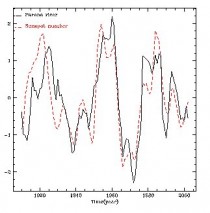By Judith Curry on Roger Pielke Jr. Blog
The primary frustration with these investigations is that they are dancing around the principal issue that people care about: the IPCC and its implications for policy. Focusing only on CRU activities (which was the charge of the Oxbourgh panel) is of interest mainly to UEA and possibly the politics of UK research funding (it will be interesting to see if the U.S. DOE sends any more $$ to CRU). Given their selection of CRU research publications to investigate (see Bishop Hill), the Oxbourgh investigation has little credibility in my opinion. However, I still think it unlikely that actual scientific malfeasance is present in any of these papers: there is no malfeasance associated with sloppy record keeping, making shaky assumptions, and using inappropriate statistical methods in a published scientific journal article.

The corruptions of the IPCC process, and the question of corruption (or at least inappropriate torquing) of the actual science by the IPCC process, is the key issue. The assessment process should filter out erroneous papers and provide a broader assessment of uncertainty; instead, we have seen evidence of IPCC lead authors pushing their own research results and writing papers to support an established narrative. I don’t see much hope for improving the IPCC process under its current leadership.
The historical temperature record and the paleoclimate record over the last millennium are important in many many aspects of climate research and in the communication of climate change to the public; both of these data sets are at the heart of the CRU email controversy. In my opinion, there needs to be a new independent effort to produce a global historical surface temperature dataset that is transparent and that includes expertise in statistics and computational science. Once “best” methods have been developed and assessed for assembling such a dataset including uncertainty estimates, a paleoclimate reconstruction should be attempted (regional, hemispheric, and possibly global) with the appropriate uncertainty estimates. The public has lost confidence in the data sets produced by CRU, NASA, Penn State, etc.
While such an independent effort may confirm the previous analysies, it is very likely that improvements will be made and more credible uncertainty estimates can be determined. And the possibility remains that there are significant problems with these datasets; this simply needs to be sorted out. Unfortunately, the who and how of actually sorting all this out is not obvious. Some efforts are underway in the blogosphere to examine the historical land surface data (e.g. such as GHCN), but even the GHCN data base has numerous inadequacies. Addressing the issues associated with the historical and paleo temperature records should be paramount. Read more here.
--------------------------
Examining Peer Review
By Kim Greenhouse, Its Rainmaking Time
Peer review was established to ensure quality and accuracy of academic research and publications. As one university library tells students, “Peer review ensures that an article - and therefore the journal and the scholarship of the discipline as a whole - maintains a high standard of quality, accuracy, and academic integrity. When you consult peer-reviewed sources, you are tapping into a wealth of established, verified knowledge.” Does this mean non-peer reviewed materials have no value? What happens if academics refuse to peer review? Are they the only arbiters of quality and accuracy?
Few people outside of academia know what it is or how it operates. Like most ideas and methods, Peer Review has evolved from its original purpose in ways that many academics never anticipated. Some of these were part of the scandals involving climate science and the perversion of scientific and academic method. While Peer-review has mostly been thought of as the way Ideas get their credibility, in fact, Peer Review has become an incestuous system that often invites corruption and territoriality so that most of the realm of new discoveries can’t make their way to the world. The Peer Review Process is often antithetical to innovation and perpetuates prevailing knowledge. We need a new and better process and paradigm because of the hugely important implications for the betterment of all of society.
Gavin Menzies, the author of 1421 and 1434 and Dr. Tim Ball, a climatologist, teacher and writer from Canada joins us to lay out what we need to know about Peer Review to get us thinking about other ways of empowering discoveries throughout the modern world. Listen to the audion discussion here. Read Ross McKitrick’s recent adventures in peer review here. See an essay on the perils of peer review by the Scientific Alliance here. See a post by Pat Michaels on a short history of the polluted peer review proces here.
Dr. David Whitehouse
A new study has postulated a link between solar activity and the flowrate of one of the largest rivers in the world, and suggests that it will lose water as the current low solar activity continues.
The quantity of water flowing down a river is a good climatic indicator since it integrates rainfall over large areas. In a paper submitted to the Journal of Atmospheric and Solar-Terrestrial Physics, Pablo Mauas and Andrea Buccino of the Institute of Astrophysics, and Eduardo Flamenco of the National Institute of Agricultural Technology, Argentina, follow-up a previous study of the influence of solar activity on the flow of the Parana River - the fourth largest river in the world by outflow - and second only to the Amazon in South America.

They find that the unusual minimum of solar activity observed in recent years has a correlation (image here) with very low water levels seen in the Parana’s flowrate. Additionally they report historical evidence of low water levels during the Little Ice Age.

They also consider flowrates for three other rivers (Colorado, San Juan and Atuel), as well as snow levels in the Andes. They conclude, after eliminating secular trends and smoothing out the solar cycle, there is a strong positive correlation between the residuals of both the Sunspot Number and the flowrates of these rivers as well.
Looking more closely at the data they say that the correlation between Sunspot Number and low water flow rates is stronger than that between flow rates and the incidence of Galacric Cosmic Rays suggesting that the chief influence on climate here is probably changes in solar irradiance and not changes in cosmic rays affecting levels of cloudiness over the region studied.
Both results imply that higher solar activity corresponds to more intense precipitation, in summer and in winter, in the large river basins of South America that have been studied.
The correlation between sunspot number and the rivers’ behavior has been tracked over more than one solar cycle suggests to the researchers that the low levels of activity expected for Solar Cycle 24 will result in a dry period for the river Parana in particular over the next decade.
Usually studies that investigate the effect of solar activity levels on climate have been carried out in the northern hemisphere and have been limited to studying Northern Hemisphere temperatures or sea surface temperatures. In recent years however some correlation has been postulated between solar activity and the Asian monsoon. This study is among the first to link the sun’s prolonged solar minimum at the end of cycle 23 to decadal variations in the weather.
BBC News
Queen’s University in Belfast has been told by the Information Commissioner to hand over 40 years of research data on tree rings, used for climate research. Douglas Keenan, from London, had asked for the information in 2007 under the Freedom of Information Act.

BBC News
Queen’s University in Belfast has been told by the Information Commissioner to hand over 40 years of research data on tree rings, used for climate research. Douglas Keenan, from London, had asked for the information in 2007 under the Freedom of Information Act.

Queen’s University has been told to hand over research data
Mr Keenan is well-known for his questioning of scientists who propose a human cause for climate change. Queen’s University refused his request saying it was too expensive, but it is now considering its position. The university claimed that as the information was unfinished, had intellectual property rights and was commercially confidential information, it did not have to pass it on. After a series of counter claims from Mr Keenan and the intervention of the Information Commissioner, Queen’s have now been told that they could be in contempt of court if they do not hand the data over.
In his legal decision, the commissioner said that Queen’s had failed in its procedural requirements and had wrongly used legal exemptions to withhold the requested information. Mr Keenan, who hopes to use the data to reconstruct temperatures during the Medieval Warm period, said “this has taken three years, but it is worth it. “It is an important victory for FoI on research data,” he said. Tree ring data is used by climate scientists to study historical climate information. See more here.
-----------------
Ration and Tax: Report Released Prior to Consideration of Senate Bill
Source: Reuters
(Corrects headline and first paragraph to reflect that report was publicized on Monday, 2nd paragraph notes report released April 8)
WASHINGTON, April 19 (Reuters) - An environmental coalition publicized a new U.S. draft report on climate change on Monday, one week before the expected unveiling of a compromise U.S. Senate bill that aims to curb greenhouse gas emissions. The Project on Climate Science, a coalition of environmental groups, publicized the report in advance of Earth Day on April 22, a spokeswoman said. The report was released with little fanfare on April 7 and posted on the Federal Register on April 8.
The report, a draft of the Fifth U.S. Climate Action Report that will be sent to the United Nations, says bluntly: “Global warming is unequivocal and primarily human-induced ... Global temperature has increased over the past 50 years. This observed increase is due primarily to human-induced emissions of heat-trapping gases.” Without action to stop them, climate-warming greenhouse gas emissions will rise over 8,000 megatonnes by mid-century, the draft said. By adopting measures detailed in a bill passed last year by the U.S. House of Representatives, these emissions will drop beneath 2,000 megatonnes. They’re now about 6,500 megatonnes. The United Nations measures greenhouse gas emissions in megatonnes, or million metric tons. The effects of climate change are already evident, the draft said: warming air and oceans, vanishing mountain glaciers, thawing permafrost, signs of instability in the ice sheets of Greenland and Antarctica and rising sea levels.
The State Department draft, now open for public comment, precedes the expected April 26 unveiling of Senate legislation by Democrat John Kerry, Republican Lindsey Graham and Independent Joe Lieberman.
Supporters of the bill hope this will pave the way for the full Senate to debate and pass a measure in June or July.
The State Department report will ultimately go to the United Nations Framework Convention on Climate Change; previous U.S. reports to this body were in 1994, 1997, 2002 and 2007.
The draft report is available online here.
In the following CEI video, see Senators Kerry, Graham & Lieberman discuss NEW names for cap and trade to trick the American people.


